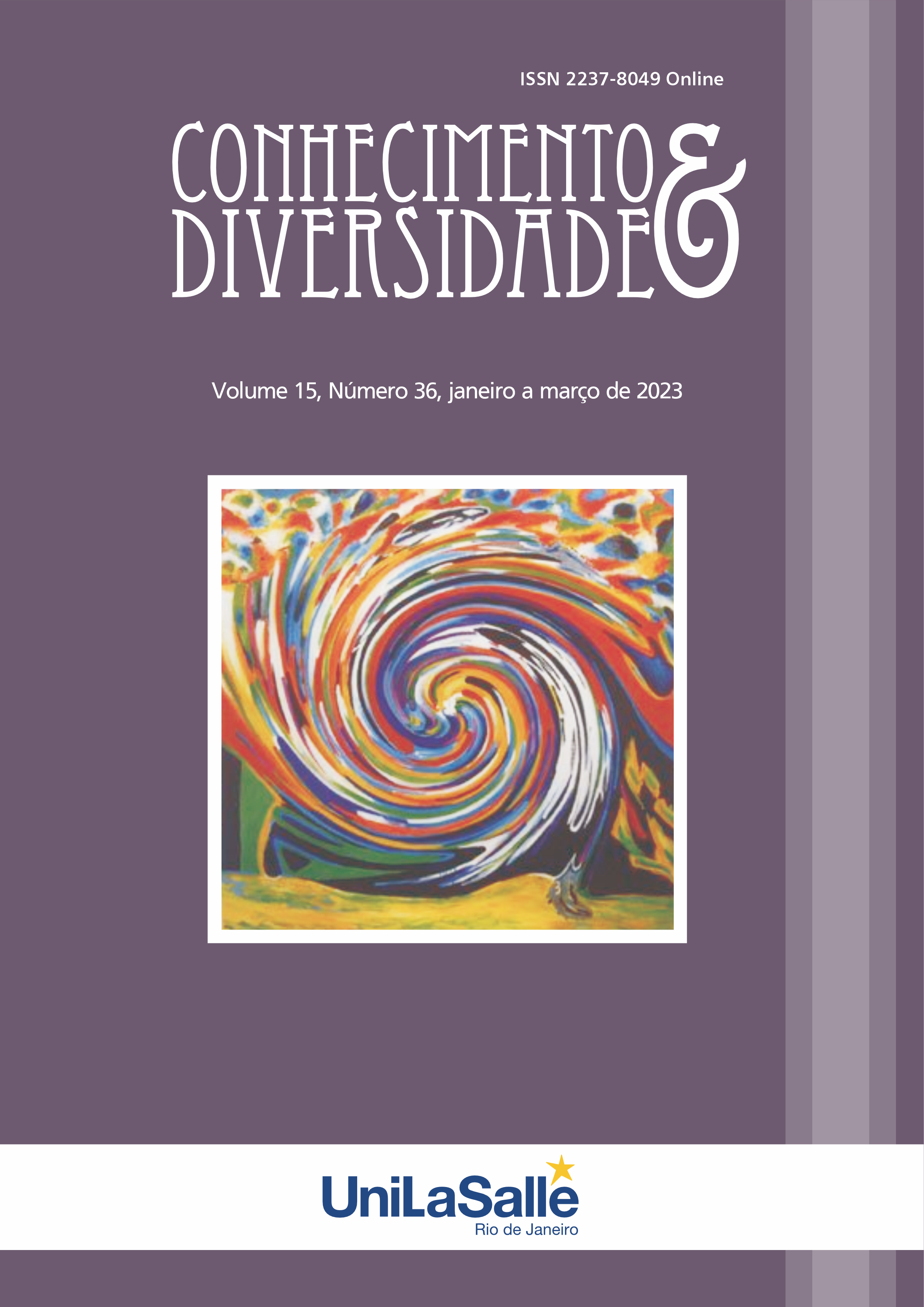O ESTUDO DA PSICOLOGIA COGNITIVA EM CONJUNTO COM A INTELIGÊNCIA ARTIFICIAL
DOI:
https://doi.org/10.18316/rcd.v15i36.10788Palavras-chave:
Artificial intelligence, Cognitive psychology, Children's mental health, Deep learning, Convolutional neural network.Resumo
O objetivo principal desta pesquisa é fornecer uma revisão e análise completa da interação entre a
inteligência artificial (IA) e a psicologia. Falo de programas de computador de última geração que são
capazes de simular a cognição e o comportamento humano (tais como Interfaces HomemComputador, modelos da mente, e programas de mineração de dados). As aplicações podem ser
divididas em várias subcategorias e têm muitos aspectos diferentes. Embora o desenvolvimento de
robôs artificialmente inteligentes tenha sido e continue sendo o principal objetivo da pesquisa e
desenvolvimento de IA, a ampla aceitação e uso de sistemas de IA resultou em uma transferência
muito mais ampla de tecnologia. O artigo começa com uma breve história da psicologia cognitiva,
uma discussão de suas idéias e modelos fundamentais, e um olhar sobre as maneiras pelas quais o
estudo está ligado à inteligência artificial (IA). A segunda parte deste artigo analisa mais de perto as
dificuldades encontradas pelo campo da interação homem-computador, juntamente com seus
objetivos, deveres, aplicações e teorias psicológicas subjacentes. Os múltiplos obstáculos científicos,
pragmáticos e técnicos (problemas de complexidade, coeficientes perturbadores, etc.) impedem a
extensão ou a superação desses limites. Também demonstramos o uso potencial da modelagem
mental nas áreas de diagnóstico, manipulação e apoio educacional neste trabalho. As previsões
podem ser feitas com o uso de mineração de dados, descoberta de conhecimento ou sistemas
especializados (por exemplo, os prognósticos de crianças com problemas mentais com base em seus
ambientes). O artigo revisa as características em falta e oferece uma visão geral dos coeficientes
utilizados no sistema. Finalmente, discutimos a aplicação de sistemas especializados e simulação de
vida (modelo mental aplicado) em realidade virtual para beneficiar as pessoas autistas e seus entes
queridos.
Referências
Cassimatis, N. L. (2006). A Cognitive Substrate for Achieving Human-Level
Intelligence. AI Magazine, 27(2), 45–56.
Chance, F. S., Aimone, J. B., Musuvathy, S. S., Smith, M. R., Vineyard, C. M., & Wang, F.
(2020). Crossing the Cleft: Communication Challenges Between Neuroscience and
Artificial Intelligence. Frontiers in Computational Neuroscience, 14, 1–9.
https://doi.org/10.3389/fncom.2020.00039
Delecraz, S., Eltarr, L., Becuwe, M., Bouxin, H., Boutin, N., & Oullier, O. (2022).
Responsible Artificial Intelligence in Human Resources Technology: An innovative
inclusive and fair by design matching algorithm for job recruitment purposes.
Journal of Responsible Technology, 11, 100041.
Foundations of Classical Artificial Intelligence and Cognitive Science. (2012).
Understanding Intelligence. https://doi.org/10.7551/mitpress/6979.003.0004
Goertzel, B., & Pennachin, C. (n.d.). The Novamente Artificial Intelligence
Engine. Artificial General Intelligence, 63–129. https://doi.org/10.1007/978-3-540-
-4_3
KAYSER, D. A. N. I. E. L. (2013). Artificial Intelligence and cognitive science. Applied
Artificial Intelligence, 5(2), 153–162. https://doi.org/10.1080/08839519108927922
Lieto, A. (2021). Cognitive science and artificial intelligence. Cognitive Design for
Artificial Minds, 1–19. https://doi.org/10.4324/9781315460536-1
Miller, T. (2019). Explanation in artificial intelligence: Insights from the social
sciences. Artificial intelligence, 267, 1-38.
Murphy, J. (2018). Artificial Intelligence, Rationality, and the World Wide Web. IEEE
Intelligent Systems, 33(1), 98–103. https://doi.org/10.1109/MIS.2018.012001557
Pennachin, C., & Goertzel, B. (n.d.). Contemporary approaches to Artificial
General Intelligence. Artificial General Intelligence, 1–30. https://doi.org/10.1007/978-
-540-68677-4_1
Rakover, S. S. (2022). How Can Behavior Be Understood if Its Explanation is Not
Comprehended? Does Cognitive Psychology Reach Its Explanatory Limit? Journal of
Mind & Behavior, 43(3), 255–268.
Red’ko, V. G. (n.d.). The natural way to Artificial Intelligence. Artificial General
Intelligence, 327–351. https://doi.org/10.1007/978-3-540-68677-4_10
Smith, E. E. (1985). Cognitive psychology. Artificial Intelligence, 25(3), 247–253.
https://doi.org/10.1016/0004-3702(85)90073-6
Thagard, P. (2007). Theory and experiment in Cognitive Science. Artificial
Intelligence, 171(18), 1104–1106. https://doi.org/10.1016/j.artint.2007.10.006
Voss, P. (n.d.). Essentials of general intelligence: The direct path to artificial general
intelligence. Artificial General Intelligence, 131–157. https://doi.org/10.1007/978-3-
-68677-4_4
Zhang, X., Wang, R., Sharma, A., & Deverajan, G. G. (2021). Artificial intelligence in
cognitive psychology—Influence of literature based on artificial intelligence on
children's mental disorders. Aggression and Violent Behavior, 101590.
Zhao J, Wu M, Zhou L, Wang X and Jia J (2022) Cognitive psychology-based artificial
intelligence review. Front. Neurosci. 16:1024316. doi: 10.3389/fnins.2022.1024316
Downloads
Publicado
Edição
Seção
Licença
Copyright (c) 2023 Conhecimento & Diversidade

Este trabalho está licenciado sob uma licença Creative Commons Attribution 4.0 International License.
Conforme recomendado pelo o Public Knowledge Project, a RCD adota para seus artigos uma licença CREATIVE COMMONS: Atribuição CC BY 4.0.
Esta licença permite que outros distribuam, remixem, adaptem e construam sobre o seu trabalho, mesmo comercialmente, desde que lhe dêem crédito pela criação original.
Esta é a licença mais adequada oferecida.
Recomendado para a máxima divulgação e uso de materiais licenciados.



